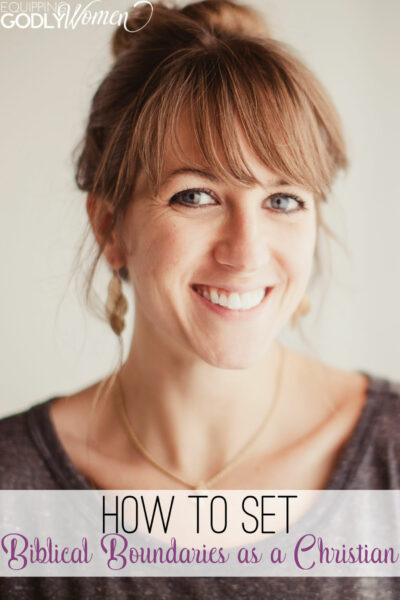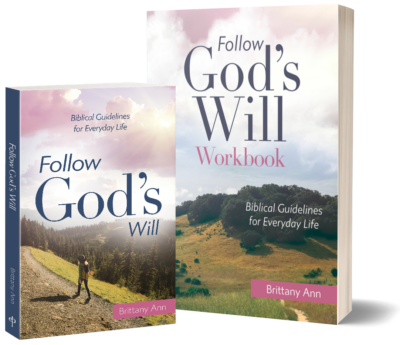How to Set Biblical Boundaries as a Christian
Tired of constantly clashing with friends/family who have no boundaries? Here’s how to set boundaries as a Christian.

Do you have a family member, friend, co-worker, church leader or even a spouse who is stressing you out with their lack of boundaries?
They might be well-intentioned, but when it comes down to it, their words and/or actions are hurting you.
As a hypothetical example, let’s say your mother-in-law has impossibly high expectations whenever you come over. You inevitably hurt her feelings almost every time you visit.
She vents to your husband, who feels stuck in the middle—and then you feel hurt that he won’t stand up for you. It’s not fair to you because she expects you to read her mind!
Related: How to Deal with Toxic Family Members Biblically
Is there a way to protect yourself from hurt, without completely breaking off the relationship?
It’s a tricky balance when you want to be humble, loving and forgiving Proverbs 31 woman, without being a doormat.
There is a way, and it’s called setting Boundaries.
Boundaries can be uncomfortable. Other people may not like them. But if we’re to follow the Bible’s example, they’re the most loving thing we can do.
*This post contains affiliate links, which means if you make a purchase after clicking through one of my links, I may make a small commission at no additional cost to you. This helps cover the many costs of running this site and allows me to help provide for my growing family. Thank you!
What Are Christian Boundaries?
Boundaries define us. They define what is me and what is not me. A boundary shows me where I end and someone else begins, leading me to a sense of ownership.
—Drs. Cloud and Townsend, Boundaries
Christian boundaries are loving limits you set in your relationships.
They help you determine which things are your responsibility, and which things are the other person’s responsibility.
As outlined in the book “Boundaries: When to Say Yes, How to Say No To Take Control of Your Life,“ God sets the example of what boundaries look like in his relationships with humanity. Starting in Genesis 1 and continuing throughout Scripture, he instructed them what to do and what not to do.
He gave them choices, and there were consequences for those choices, good or bad. Every person would then take ownership of their decisions.
Regardless of people’s choices, God has never changed in his love and his goodness. But he is very clear about his expectations.
Likewise, as godly women, we too can love other people by setting boundaries in our relationships.
Speaking of setting boundaries… The BEST resource I’ve found for figuring out how to set good, fair, Christian boundaries is “Boundaries: When to Say Yes, How to Say No To Take Control of Your Life” by Henry Cloud and John Townsend.
In this very popular New York Times bestseller, Drs. Cloud and Townsend offer a TON of great Biblical insight on what behaviors are appropriate and not, how to set boundaries, and how to stick up for yourself without being a jerk OR a pushover in the process.
If you ever wonder, “How do I set limits and still be a loving person?” “Where should those limits be?” or “How can I learn to say no without feeling so guilty,” this book will absolutely help.
I’ve recommended it to quite a few people now, and I know you’ll really enjoy it and benefit from it too. Definitely worth checking out!

What Is God’s Will for Your Relationships with Difficult People?

Have you wondered how God wants you to deal with difficult people?
Is it always God’s will that I turn the other cheek? And what exactly does that phrase mean anyway? Am I obligated to stay in contact with people who continue to hurt me?
If so, I’d love for you to check out my brand new book, Follow God’s Will: Biblical Guidelines for Everyday Life, along with the Follow God’s Will companion workbook.
Practical, encouraging, and full of biblical truth, Follow God’s Will is designed to help you answer questions including:
- What does God want me to do?
- How do I apply the Bible’s instructions to my life today?
- Where is God calling me personally?
- How can I make a difference right where I am?
- How should I navigate relationships with those who think, act, or believe differently than I do?
- And so many more!
Want to start reading for free?
Simply enter your first name and email below, and I’ll send you an exclusive “first-peek” right away, right to your inbox!
How to Set Christian Boundaries in 4 Steps
When we practice boundaries, we take ownership of four things:
- Our thoughts
- Our feelings
- Our bodies
- Our decisions
Likewise, we let other people take ownership of their thoughts, feelings, bodies and decisions, rather than taking responsibility for what really isn’t ours.
You can set up healthy Christian Boundaries in 4 basic steps.
1. Take a Brutally Honest, Prayerful Assessment
When dealing with a toxic relationship, the first thing you’ll want to do is pray about it. Be honest and tell God about your feelings (I recommend out loud or on paper). Ask for wisdom, as in James 1:5.
Here are some questions you could pray through to help you get gut-level honest.
- How are you feeling about the situation and why?
- What do you wish it could be different?
- Is the other person sinning against you? How?
You could also seek counsel about the situation, but be careful that you’re not gossiping or trying to turn people against the offender. Be discreet and seek to get input, not just vent your frustration.
2. Define Your Boundaries
Once you’ve gotten honest about the situation, it’s time to take ownership of what’s yours—and let go of what’s not. In this way you’ll define your boundaries. Remember, you’re responsible for your thoughts, feelings, body and decisions, no one else’s.
Continue to do this in prayer and with a trusted advisor, if possible.
Your hypothetical mother-in-law says you make her feel unappreciated and unloved. You know that you don’t own her feelings; she does. But she’s not following the same rules you are.
If this is a pattern, you could define boundaries in this way:
“When my mother-in-law starts blaming me for her feelings, I will apologize for anything I did that was sinful or disrespectful, but nothing more. I’ll tell her I’m trying my best and that I hope she forgives me. But beyond that, the conversation will be over.”
You might also have to explain your limits to others who are involved. In this scenario, you could say to your husband that you are not responsible for his mother’s feelings and neither is he. He might not get on board, but if you have good boundaries, that’s on him!
Related: When Your Husband Makes Decisions You Don’t Agree With
If you’re not sure what limits you should set, consider the following questions:
- Is someone blaming me for something that is their responsibility?
- What is reasonable for someone to ask of me, and what is not?
- What are my expectations from this person? Are those reasonable?
- What do I need to communicate so that my limits are understood?
3. Establish Consequences
Once you have defined your limits, you will also want to define consequences for when those limits are broken. If the other person continues to violate your boundaries, what then?
After all, it won’t do you any good to read all your favorite Christian websites, listen to tons of Christian podcasts and get great tons of awesome relationship advice if you don’t put what you’ve learned into practice in real life.
So, how do you do this, practically speaking?
This might mean removing yourself from an emotionally harmful situation. It can be a tricky line to walk, but I like to consider Jesus’ example. He said to turn the other cheek, but he also stood up to those who opposed him and walked away when he wanted to.
Consequences should be chosen prayerfully—and preferably ahead of time, so that you’re not making a decision in the heat of the moment.
Let’s say your mother-in-law always gets in a huff whenever you go to her house because you don’t put her dishes away correctly. If she continues to harass you, you have the power to decide that you won’t be going to her house if she treats you that way. The family can meet elsewhere.
This is the step that can be painful and may also require courage. But it’s also the most powerful when done in a calm and respectful way.
And don’t forget—in order for consequences to work, you actually have to follow through with them! Once you’ve made a decision, stick to it.
Related: How to Respond to an Adult Child Living in Sin
4. Reassess
A wise friend once told me that boundaries are like fences, not brick walls.
While it’s important to stick to the boundaries you’ve decided upon, you might not need to stick with them forever, and there may be exceptions.
Hopefully, once other people see that you’re serious, they might start changing their behavior.
For the sake of argument, imagine you go a year without incident with your hypothetical mother-in-law. At that point, you might consider adjusting your boundaries. Even if it doesn’t go perfectly, maybe you can be a little more flexible.
Figuring out boundaries as a Christian is hard, and you’re never really done with this process. As long as you have conflict with other people, you are dealing with boundaries.
Want to Learn More About God’s Will and Loving Others?

We are called to love others — but what does that mean when it comes to boundaries? How can we follow God’s will and take care of our spiritual health in challenging relationships?
If you’d like to dive deeper into what God’s will looks like in your life, check out my brand new book, Follow God’s Will: Biblical Guidelines for Everyday Life, along with the Follow God’s Will companion workbook.
Practical, encouraging, and full of biblical truth, Follow God’s Will is designed to help you answer questions including:
- What does God want me to do?
- How do I apply the Bible’s instructions to my life today?
- Where is God calling me personally?
- How can I make a difference right where I am?
- How should I navigate relationships with those who think, act, or believe differently than I do?
- And so many more!
Want to start reading for free?
Simply enter your first name and email below, and I’ll send you an exclusive “first-peek” right away, right to your inbox!
I’d love to hear from you: Is there a situation you need to set boundaries in as a Christian? How might these steps help?








41 Comments